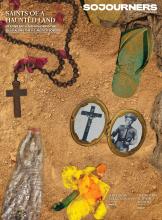THE LAST PICTURE in Richard Avedon and James Baldwin’s Nothing Personal, an exploration of American identity through the photographer’s eye and the essayist’s heart, holds a haunting some 60 years later. Two young boys look solemnly into Avedon’s lens. It is as if they stare into the soul of the watcher. It is as if in their innocence they wonder about the world in their silence. It is the children’s eyes that I can’t stop thinking about.
Their eyes are still our eyes, their gaze, still our gaze — weary, longing, determined, and despairing. Baldwin writes in the 1964 book, “Despair: perhaps it is this despair which we should attempt to examine if we hope to bring water to this desert.”
Baldwin and Avedon’s friendship and work together can be instructive for us because what we face as a nation is not much different from the Civil Rights years. We are presently dealing with a lack of trust; the forces of polarization are deepening within and without. There is, writes Baldwin, an “unspeakable loneliness” that we feel, wondering if anyone can feel what we feel and are angry about what we are angry about and are sad about what we are sad about. Then there is the kind of loneliness that takes root when “we live by lies.”
Read the Full Article

